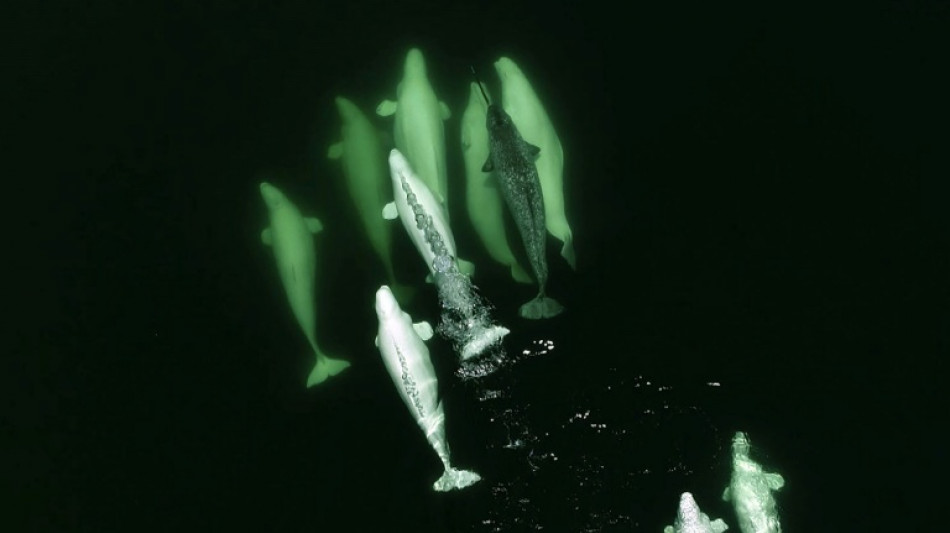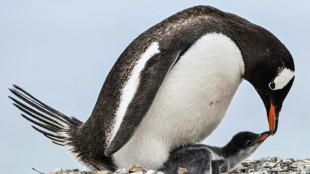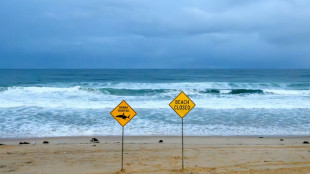
-
 AI reshaping the battle over the narrative of Maduro's US capture
AI reshaping the battle over the narrative of Maduro's US capture
-
Penguins bring forward breeding season as Antarctica warms: study

-
 Vietnam leader pledges graft fight as he eyes China-style powers
Vietnam leader pledges graft fight as he eyes China-style powers
-
Ukrainian makes soldier dad's 'dream come true' at Australian Open

-
 'Timid' Keys makes shaky start to Australian Open title defence
'Timid' Keys makes shaky start to Australian Open title defence
-
Indiana crowned college champions to complete fairytale season

-
 South Koreans go cuckoo for 'Dubai-style' cookies
South Koreans go cuckoo for 'Dubai-style' cookies
-
Harris leads Pistons past Celtics in thriller; Thunder bounce back

-
 Tjen first Indonesian to win at Australian Open in 28 years
Tjen first Indonesian to win at Australian Open in 28 years
-
Long-delayed decision due on Chinese mega-embassy in London

-
 Djokovic jokes that he wants slice of Alcaraz's winnings
Djokovic jokes that he wants slice of Alcaraz's winnings
-
Trump tariff threat 'poison' for Germany's fragile recovery

-
 Tourists hit record in Japan, despite plunge from China
Tourists hit record in Japan, despite plunge from China
-
Jittery Keys opens Melbourne defence as Sinner begins hat-trick quest

-
 The impact of Trump's foreign aid cuts, one year on
The impact of Trump's foreign aid cuts, one year on
-
Belgian court weighs trial for ex-diplomat over Lumumba killing

-
 Inside China's buzzing AI scene year after DeepSeek shock
Inside China's buzzing AI scene year after DeepSeek shock
-
Asian markets sink, silver hits record as Greenland fears mount

-
 Shark bites surfer in Australian state's fourth attack in 48 hours
Shark bites surfer in Australian state's fourth attack in 48 hours
-
North Korea's Kim sacks vice premier, rails against 'incompetence'

-
 Spain mourns as train crash toll rises to 40
Spain mourns as train crash toll rises to 40
-
'Very nervous' Keys makes shaky start to Australian Open title defence

-
 Vietnam leader promises graft fight as he eyes China-style powers
Vietnam leader promises graft fight as he eyes China-style powers
-
Dad-to-be Ruud ready to walk away from Australian Open

-
 North Korea's Kim sacks senior official, slams 'incompetence'
North Korea's Kim sacks senior official, slams 'incompetence'
-
Farewells, fresh faces at Men's Fashion Week in Paris

-
 'I do not want to reconcile with my family' says Brooklyn Peltz Beckham
'I do not want to reconcile with my family' says Brooklyn Peltz Beckham
-
EU leaders take stage in Davos as Trump rocks global order

-
 Blast at Chinese restaurant in Kabul kills 7
Blast at Chinese restaurant in Kabul kills 7
-
Warner hits 'Sinners' and 'One Battle' tipped for Oscar nominations

-
 Colombian paramilitary-turned-peace-envoy sentenced over atrocities
Colombian paramilitary-turned-peace-envoy sentenced over atrocities
-
Gilgeous-Alexander leads Thunder in rout of Cavaliers

-
 Seahawks blow as Charbonnet ruled out for rest of season
Seahawks blow as Charbonnet ruled out for rest of season
-
Kostoulas stunner rescues Brighton draw after penalty row

-
 Man Utd greats tell Martinez to 'grow up' as feud rumbles on
Man Utd greats tell Martinez to 'grow up' as feud rumbles on
-
LeBron James' All-Star streak over as starters named

-
 Allies tepid on Trump 'peace board' with $1bn permanent member fee
Allies tepid on Trump 'peace board' with $1bn permanent member fee
-
Ninth policeman dies in Guatemala gang riots, attacks

-
 Man City's Foden to play through pain of broken hand
Man City's Foden to play through pain of broken hand
-
Milan Fashion Week showcases precision in uncertain times

-
 Public media in Europe under unprecedented strain
Public media in Europe under unprecedented strain
-
Africa Cup of Nations refereeing gets a red card

-
 Tributes pour in after death of Italian designer Valentino
Tributes pour in after death of Italian designer Valentino
-
Bills fire coach McDermott after playoff exit: team

-
 Chile wildfires rage for third day, entire towns wiped out
Chile wildfires rage for third day, entire towns wiped out
-
Valentino, Italy's fashion king who pursued beauty at every turn, dies at 93

-
 France PM to force budget into law, concedes 'partial failure'
France PM to force budget into law, concedes 'partial failure'
-
Allies tepid on Trump 'peace board' with $1bln permanent member fee

-
 'My soul is aching,' says Diaz after AFCON penalty miss
'My soul is aching,' says Diaz after AFCON penalty miss
-
Ex-OPEC president in UK court ahead of corruption trial


Narwhals' climate-vulnerable winter feeding crucial for survival: study
Narwhals are likely more dependent on fat reserves and abundant prey in climate-threatened winter habitats than previously thought, researchers said Wednesday, warning of severe risks posed by global warming.
Scientists studying the long-horned marine mammals in the fjords off the eastern coast of Greenland during the summer found narwhals were largely unsuccessful in capturing prey.
"(This) suggests that they could actually rely on the wintering grounds to build up sufficient body reserves and energy stores to sustain year-round activities," said Philippine Chambault of the University of California Santa Cruz, co-author of the study published in the journal Biology Letters.
Researchers believe most narwhals spend their winters feasting off fish and squid under sea ice off the coast of Greenland, but Chambault said this cold-water habitat may essentially "disappear" because of climate change, with expected increases in ocean temperatures driving ice melt and potentially causing prey to relocate.
While the exact causes of the low summer feeding rate are not yet clear, researchers said it could be due to a decline or relocation of squid and cod, lower energy needs, or even because they are picky eaters.
Normally narwhal eating habits are hard to track because they dive deep, up to one kilometre (3,000 feet) and stay in the open water.
The researchers were able to study the foraging behaviours of 14 narwhals using so-called stomach temperature pills that could detect when the whales swallowed cold prey and icy water.
They also used acoustic tags tuned to the sound waves or "buzzes" emitted when narwhals narrow-in on their prey.
- 'Little flexibility' -
More than two-thirds of the hunting dives recorded over roughly 1,000 hours were deemed unsuccessful due to the presence of buzzes without an accompanying stomach temperature drop, said the study.
The researchers said the small sample size and limits to the detection capabilities of the equipment meant the feeding rates could be underestimated.
But they also worked with local indigenous Inuit communities to test their findings.
Inuit hunters examined the stomach contents of the narwhals caught during summer hunting season, confirming that the whales' stomachs were in fact "pretty empty", Chambault told AFP.
Diet limitation is just one factor complicating the species' survival.
Their preference for cold water and a strong tendency to remain within or near where they were born mean they are particularly sensitive to climate change.
This means they might "show very little flexibility to changing habitats," Chambault said.
N.Fournier--BTB



